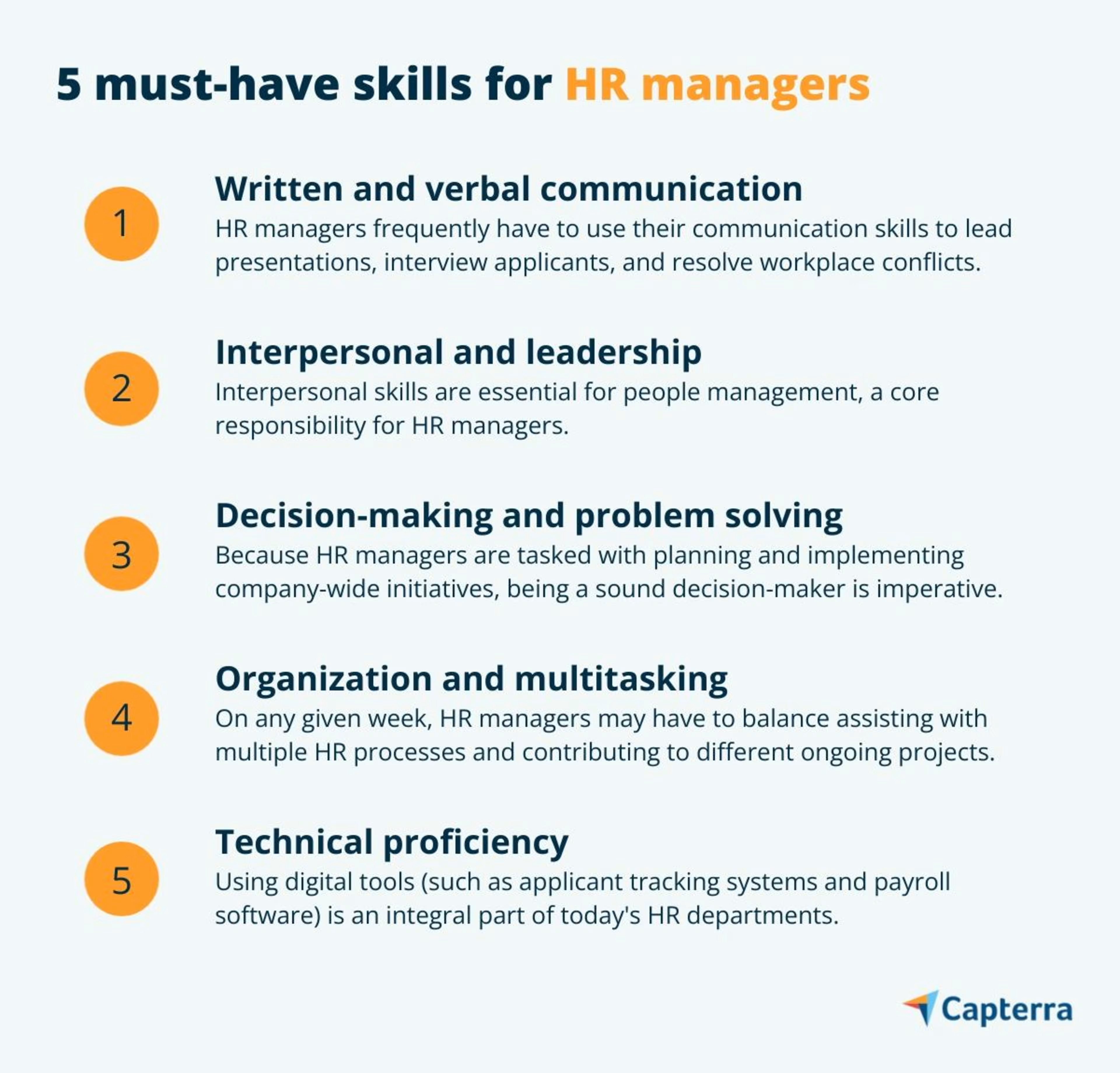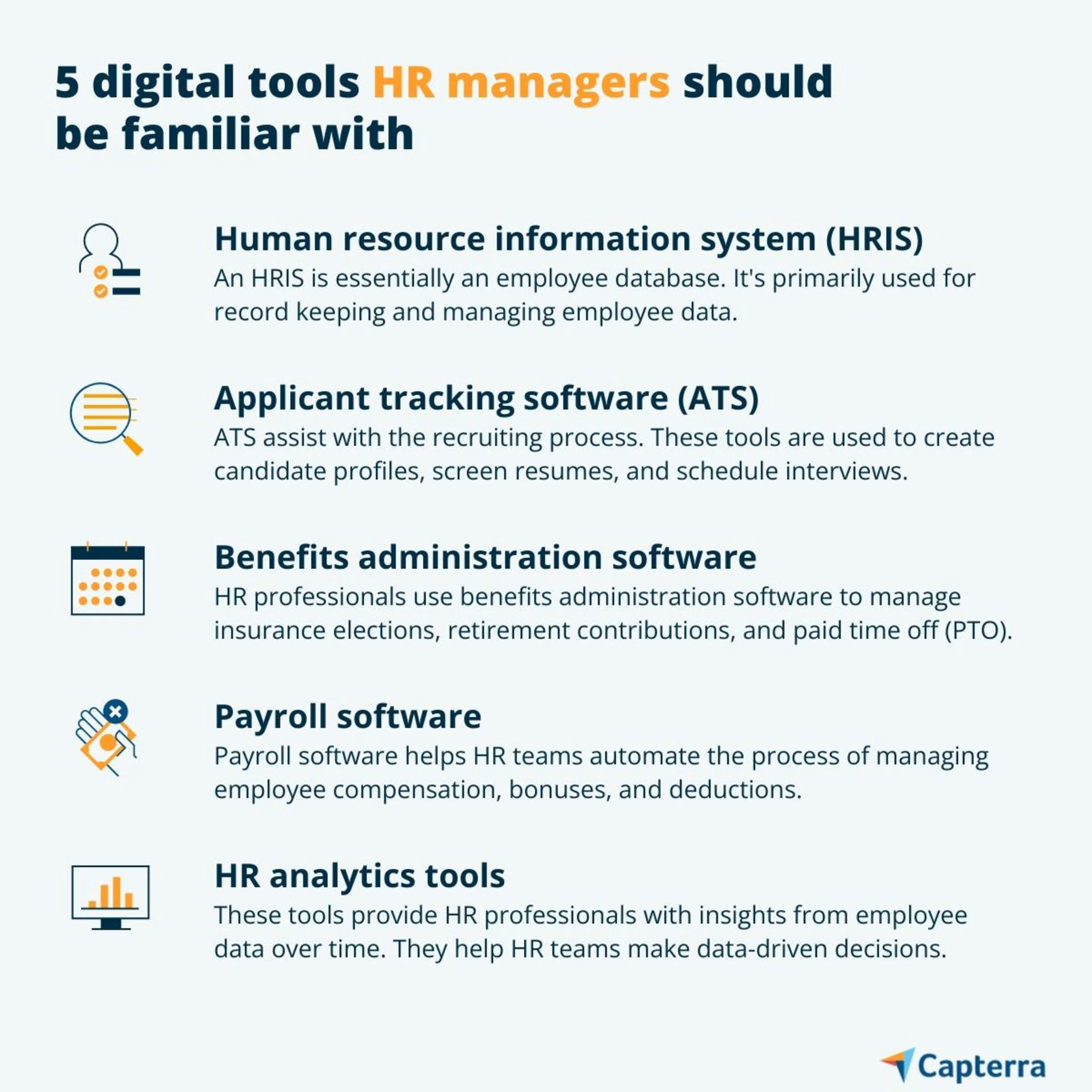If you want a strong HR department, you need a strong HR manager. Look for these five traits when hiring your next HR leader.
Did you know that there are currently around 10.9 million open jobs in the United States alone?
Recruiters are feeling it. In a recent Capterra survey, we asked them to rate the difficulty of finding, attracting, and recruiting job seekers to their employer on a scale from 1 (not difficult at all) to 7 (extremely difficult).
The majority of them rated their experience as a 5… and nearly 10% chose a 7.
The pressure to fill openings only grows when those roles are critical ones, which is what makes hiring an HR manager such an intimidating task.
From succession planning to ensuring compliance with employment laws, HR managers are in charge of leading the HR function, and a role with that many responsibilities can’t be filled by just anyone—you need a candidate with years of experience as an HR professional, and a skillset that equips them to handle the many tasks ahead of them.
As a hiring decision-maker, it’s important to have a full understanding of the necessary qualities you need in your next HR manager. We’ve made it easy for you by putting together this list of the top five skills for an HR manager, along with questions you can ask interviewees to determine whether they have those traits.
5 skills you need in an HR manager

1. Written and verbal communication skills
Most of the daily responsibilities of an HR manager require strong written and verbal communication skills.
One of the key tasks an HR manager oversees is managing the talent acquisition process—which requires corresponding with department managers to understand what they are looking for in a new hire, then relaying that information back to the rest of the recruiting team.
Further, HR managers are frequently expected to present information to company leadership, interview job candidates for important roles, and resolve conflicts between coworkers—all responsibilities that call for exceptional communication skills.
Ask the following interview questions to determine if a candidate has good communication skills:
In your opinion, is it more important to be a good listener or a good communicator?
How would you approach a conversation about a sensitive topic with a coworker?
Tell us about a time you had to relay bad news to a client or colleague.
2. Interpersonal and leadership skills
Every organization’s hierarchy is different, but typically, HR managers have direct reports (usually an HR generalist and an HR specialist) to supervise.
As a people manager, they need interpersonal skills such as empathy, emotional intelligence, and active listening in order to foster a positive and collaborative team dynamic. Plus, these traits will make communicating with employees or senior managers outside of the HR team go smoothly.
Ask the following interview questions to determine if a candidate has interpersonal skills:
Talk about a time when you’ve had to collaborate with a difficult coworker. How did you handle the situation?
People management is a core responsibility of this role. How would you describe your personal management style?
Have you previously led a team of workers from different backgrounds? If yes, can you share your experience with us?
3. Decision-making and problem solving skills
From improving the employee experience at your workplace to launching a learning and development program, planning and implementing HR strategies is a large part of what HR managers do. Oftentimes, these initiatives affect your entire workforce, which means that the individual who is behind them needs to be a sound decision-maker with excellent problem solving skills.
Ask the following interview questions to determine if a candidate has strong decision-making and problem solving skills:
Tell us about a time when you had to change your planned course of action at the last moment. How did you handle this situation?
What is your typical approach when tasked with making an important decision?
What experience do you have leading a project team as an HR manager?
4. Organization and multitasking skills
According to the Society for Human Resource Management (SHRM), an HR manager’s duties include the following:
Partnering with leadership to plan and execute human resource and talent strategy
Providing support and guidance to the rest of the HR department
Managing the talent acquisition process
Staying on top of trends in compensation and employee benefits
Reviewing policies to ensure compliance with state and federal employment laws
With so many different projects, processes, and administrative tasks to keep track of, organization and multitasking skills are must-have traits for a successful HR manager.
Ask the following interview questions to measure a candidate’s organization and multitasking skills:
In your past experience, have you had to juggle multiple work deadlines?
What is your approach to staying organized while working on different projects?
Have you ever had to delegate a task to a member of your team?
5. Technical aptitude
Today’s HR departments rely on technology for assistance with many basic HR functions such as running payroll, keeping employee records, and recruiting new talent. What’s more, recent innovations in HR technology have made more complex tasks such as strategic planning or analyzing employee engagement trends much easier to accomplish.
Your next HR manager will have to work with a variety of digital tools on a weekly basis—which means that the ideal candidate will be tech savvy and have previous experience working with HR software.
During the interview process, it’s helpful to know what kind of software your future HR manager will have to interact with. We’ve put together a list of five common tools HR managers should be familiar with:

Ask the following interview questions to measure a candidate’s technical experience:
What kind of tools did you use on a daily or weekly basis at your last job?
Do you have any past experience implementing new HR software?
What new software or technology have you recently worked with? How did you come to learn it?
Building your HR dream team? Check out these related resources
The importance of a strong human resources function can’t be overstated. They’re the ones who make sure employees get paid, laws are followed, and your company culture is positive and productive. That’s why finding the right HR manager is such an important task.
There’s more you can do to support your HR function. If you’re looking for ideas, these related resources are a great place to start:
Ready to hire a recruiting agency for your business needs? Browse our list of companies in the following areas:
